A former New York City firefighter who joined rescue and recovery operations on 9/11 is now fighting for the 9/11 community as the 20th anniversary of the attack on the World Trade Center approaches.
Richard Alles was a Brooklyn battalion chief when the World Trade Center was attacked on September 11, 2001, and arrived at Ground Zero some 20 minutes after the second tower had collapsed.
Alles spent the following two weeks trying to rescue survivors in what became the largest search and rescue operation in the history of the United States.
"It wasn't until two weeks afterward that we realized we weren't going to find anyone," Alles told IrishCentral, adding that the search and rescue operation became a recovery effort for the following nine months.
First responders at Ground Zero, however, did not have adequate gear for a search and rescue operation.
Air tanks used by the fire department to fight internal structural fires supply between 20 and 30 minutes of oxygen depending on a person's activity, meaning that they were almost entirely useless for the endless search and rescue efforts.
"We were never prepared for an operation like that," Alles said.
First responders also did not have access to filtered masks and were forced to use paper masks, which often became clogged with toxins and were often discarded.
Despite assurances from the City that the air was safe to breathe, Alles instinctively knew that something was wrong.
"As a first responder, I knew inherently that the air was not safe to breathe."
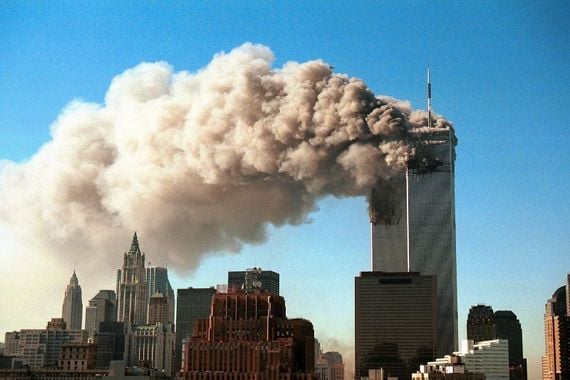
September 11: The 2001 attack on the World Trade Center in New York.
However, Alles said that he knew the risks of his job and had no option but to persevere.
"As a responder, we should have had better stuff, but we didn't at the time. But what do you do? Not do your job?"
Broadly speaking, Alles was fortunate to avoid major health scares in the two decades since 9/11. He suffered from reactive airway issues for several months following the search and rescue and made a full recovery from a skin cancer diagnosis in 2010.
Skin cancer has proved to be the most prevalent 9/11-related illness due to the PH levels of toxins in the air at the World Trade Center.
Fortunately for Alles, non-melanoma cases are not life-threatening if found early and he was able to make a full recovery.
Others have been less fortunate.
More than 4,000 survivors have died from 9/11-related illnesses in the two decades since the attack on the World Trade Center, with 68 different cancers linked to the toxic chemicals that hung in the air of Lower Manhattan following the collapse of the twin towers. Victims of 9/11-related illnesses now far exceed the 2,996 people who died when the towers collapsed in 2001.
Alles has spent his post-9/11 career fighting for the 9/11 community and was elected to his fire officers union in 2007 to lobby for legislation supporting victims of the September 11 attacks.
He has since retired from the fire department and now works for law firm Barasch McGarry on behalf of the 9/11 community.
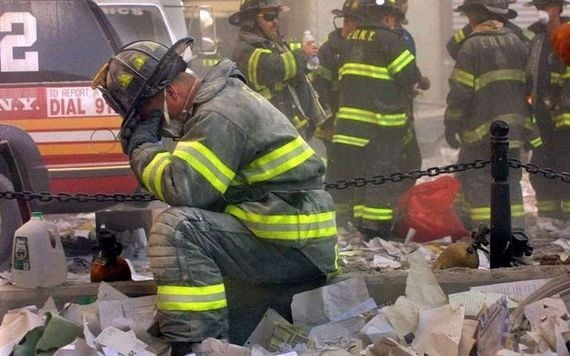
A firefighter in the aftermath of the 9/11 attack.
He told IrishCentral that he feels most sympathy for everyday citizens who were told to return to their jobs and homes in the Financial District shortly after the attack.
"There was an emphasis on the surrounding area around Ground Zero to get back to normal and there was an emphasis on getting the New York Stock Exchange reopened as a symbol to our enemies that you can't knock America down," Alles said.
"People who lived in residential buildings in that zone were told to go back home and went back to clean up their apartments. They thought they were cleaning up dirt and debris because that's what it looked like. Toxic dust and debris look no different than non-toxic dust and debris.
"Those are the people I feel the most sympathy for. I call them the forgotten people of the 9/11 community."
Alles said that many survivors do not even realize that they are entitled to compensation because of a misconception that the aid is reserved for first responders.
"A lot have fallen through the cracks."
Reflecting on the 20th anniversary of the 9/11 attacks, Alles said that it sometimes feels as if it happened yesterday.
He said that he will not do anything different to mark the 20th anniversary and said that he plans to join other firefighters and "mourn in a group setting where words don't need to be expressed".
He said that he lost close friends during 9/11 and in the aftermath.
"I have lost a lot of friends in the fire department and I try not to let it get me down."
"Each year on September 11, I take a step back and focus on memories and try to be reflective. I'll be doing that this year, no more, no less than I did in years 2, 3, 4, 5. People like round numbers, it's dramatic because it's 20 years."
Alles added that many 9/11 survivors have been severely impacted by the COVID-19 pandemic over the past 18 months due to their underlying conditions.
More than 100 Barasch McGarry clients have died after contracting the virus over the past 18 months, while many survivors were left without access to medical appointments when the World Trade Center Health Program clinic shut its doors due to public health advice.
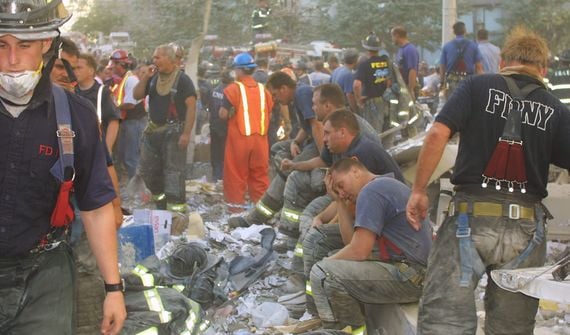
First responders at Ground Zero after 9/11.
"It was a scary time for the 9/11 community. All of these pre-existing conditions were the number one fear factor at the time."
Alles said that elected officials had not done enough to make 9/11 survivors aware of the dangers of the pandemic and added that the 9/11 community was often forgotten over the past 18 months.
"I don't think they've done enough for the 9/11 community. Sometimes I think that the 9/11 community is forgotten about. You don't hear an emphasis on that particular group. I hear a lot about the pandemic and fighting covid, but with no emphasis at all on the 9/11 community."
Comparing the experiences of first responders during 9/11 and the COVID-19 pandemic, Alles said that first responders today faced a completely different threat.
"What made the pandemic different was that we had first responders working against an unseen enemy with a risk of bringing it home to their families," he said.
Alles has pledged support for a coronavirus victims compensation fund that would work on a similar level to the September 11th Victim Compensation Fund that awarded monetary compensation to victims and their dependents.
New York Democratic Representative Adriano Espaillat has introduced a COVID–19 Victims Compensation Fund Act into Congress and Alles believes that it has a good chance of passing in the coming years.
Alles, who is deeply proud of his Irish heritage through his grandparents, helped to organize a massive delivery drive to help first responders throughout New York City during the pandemic.
Organized by Barasch McGarry, the donation drive brought food, masks, gloves, and other badly-needed essential items to firehouses, police stations and hospitals throughout the city.
"It was a good experience and well appreciated by everyone that we were able to help. What else could we do?"
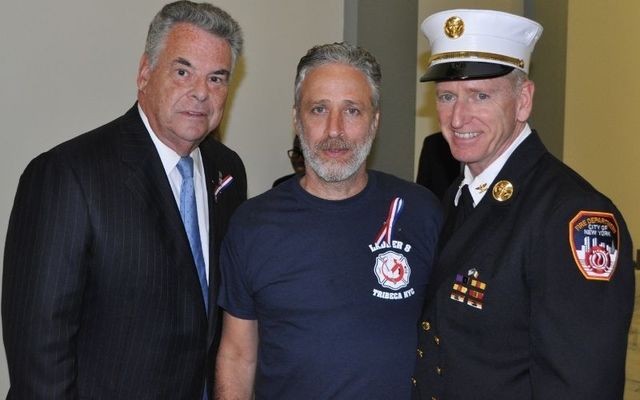


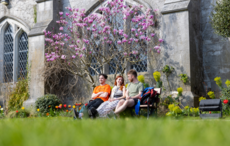
Comments